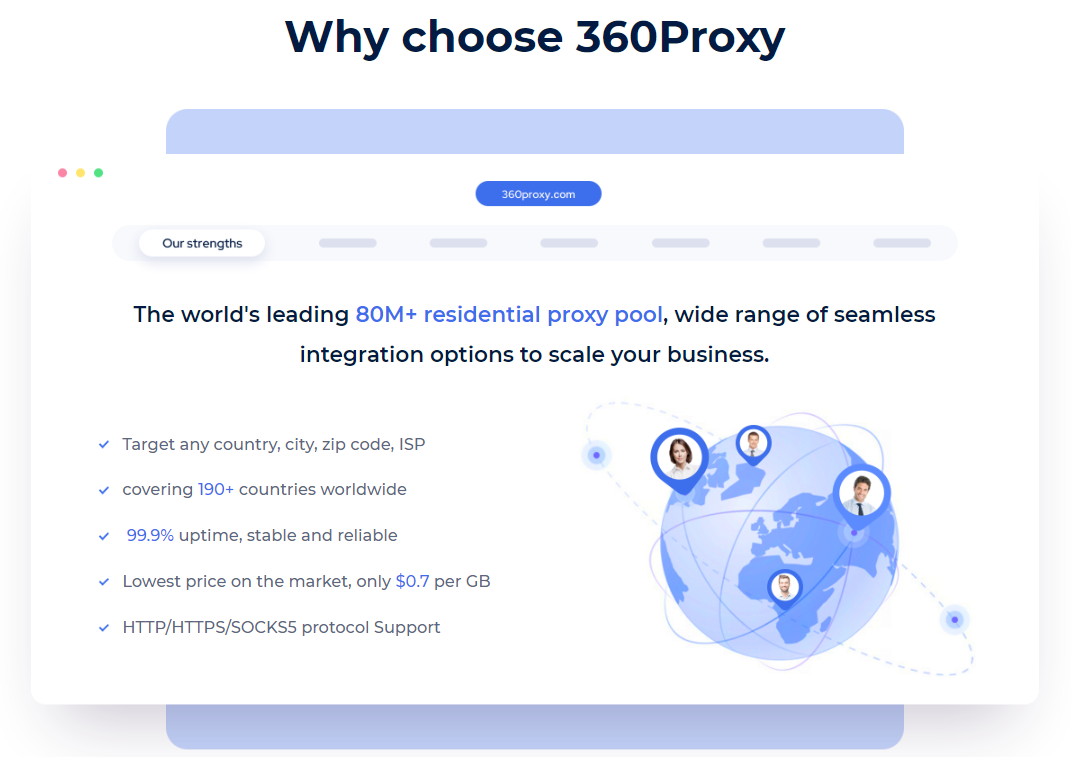Introduction
In the vast ocean of the Internet, every online device has a unique identifier, which is an IP address. Dynamic residential IP is a special type of Internet technology. Its working principle and privacy protection method are different from other IP types. This article will explain in detail how dynamic residential IP works and discuss its importance to privacy protection.
How Dynamic Residential IP Works
1. IP Address Overview
First, we need to understand what an IP address is. IP is the abbreviation of Internet Protocol in English. It is a protocol designed for computer networks to communicate with each other. In Internet communications, each device needs a unique IP address to identify and locate it during data transmission.
2. Definition and characteristics of dynamic residential IP
Dynamic residential IP is a special type of IP address that is usually dynamically assigned to users by an Internet Service Provider (ISP), and may receive a new IP address each time the user reconnects to the Internet. The main characteristic of this IP address is its uncertainty, which makes tracking and locating difficult due to its frequent changes.
3. How to allocate dynamic residential IP
Dynamic residential IPs are usually allocated dynamically by the user's ISP each time the user connects to the Internet. The specific allocation mechanism may vary depending on the ISP's policy and service type, but it is usually based on the user's geographic location and network needs.
4. Dynamic residential IP and privacy protection
Due to the frequent changes and uncertainty of dynamic residential IPs, this IP type has special significance for privacy protection. For example, when hackers or malware attackers conduct network attacks, they often need to locate the static IP address of the target device before they can conduct subsequent attacks. The frequent changes of dynamic residential IPs make this process very difficult, thereby effectively reducing the risk of network attacks.
The significance of dynamic residential IP for privacy protection
1. Enhance network security
The variability of dynamic residential IPs makes it difficult for network attackers to track and locate target devices, thereby improving network security. This is especially important for individual users and small business users, who often lack adequate technical support and resources to deal with sophisticated cyberattacks.
2. Prevent malware attacks
Malware attacks often need to locate the static IP address of the target device before they can infect and spread on a large scale. The frequent changes of dynamic residential IPs make this step extremely difficult for malware attackers, thus effectively reducing the risk of malware attacks.
3. Protection of personal information
The privacy protection feature of dynamic residential IP can also effectively protect users' personal information. For example, when a user uses an Internet service, the service provider may need to obtain the user's IP address for traffic statistics or to provide certain geographical location-based services. However, if the user uses a dynamic residential IP, the service provider can only obtain the temporary IP address currently used by the user, but cannot obtain the user's real personal information.
In conclusion
The working principle of dynamic residential IP and the protection of privacy are its important features in Internet technology. By understanding how dynamic residential IP works and how privacy is protected, we can better understand its important role in network security and privacy protection.
The development trend of dynamic residential IP
As Internet technology continues to evolve, so does dynamic residential IP. New technology trends and the development of standards may have an impact on its working principles and privacy protection mechanisms. For example, the gradual popularization of IPv6 may pose new challenges and opportunities for dynamic residential IP allocation methods and privacy protection.
Practical application scenarios of dynamic residential IP
In addition to network security and privacy protection, dynamic residential IP also plays a key role in many practical application scenarios. For example, when tracking network activity, law enforcement agencies may exploit changes in dynamic residential IPs to track criminal activity while protecting user privacy.
Dynamic Residential IP Challenges and Solutions
Although dynamic residential IP has significant advantages in improving network security and protecting privacy, it also faces some challenges. Network service providers need to develop effective allocation strategies to balance the effective use of network resources and the protection of user privacy. Additionally, potential abuse scenarios may need to be addressed to ensure that changes to dynamic residential IPs are not used for malicious purposes.
The relationship between dynamic residential IP and mobile Internet
With the popularity of mobile Internet, users not only use the Internet at home, but also connect on mobile devices. Dynamic residential IP may face more challenges and opportunities under this trend, requiring more flexible allocation and management methods to adapt to the needs of users in different environments.
Future direction
Going forward, dynamic residential IP may play a role in a wider range of network environments, including the Internet of Things and smart homes. Its development direction may involve smarter distribution algorithms, more powerful privacy protection technology, and tighter protocol standards to adapt to the changing Internet ecology.
By in-depth understanding of the development trends, practical application scenarios, challenges and solutions of dynamic residential IP, and its relationship with the mobile Internet, we are able to more fully understand and evaluate the importance of this Internet technology. Hopefully these extensions will provide readers with deeper insights.
360Proxy provides 100% real residential proxy resources, covering 190+ countries and regions, and 80M+ residential IP resources. To meet the different needs of users, such as media account management, ESTY and SEO optimization, 360Proxy is a good assistant that can provide huge help!

 Username: Password
Username: Password
 Whitelist IP
Whitelist IP
 Proxy Manager
Proxy Manager
 Google Chrome Extension
Google Chrome Extension





























 Dashboard
Dashboard Sign Out
Sign Out






























 USA
USA France
France Brazil
Brazil Vietnam
Vietnam Spain
Spain









